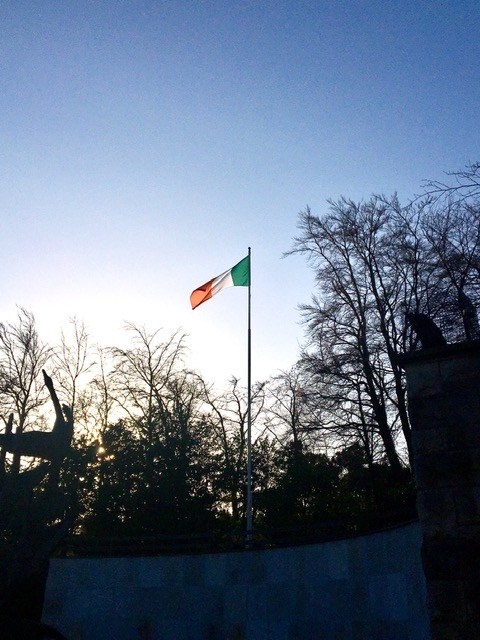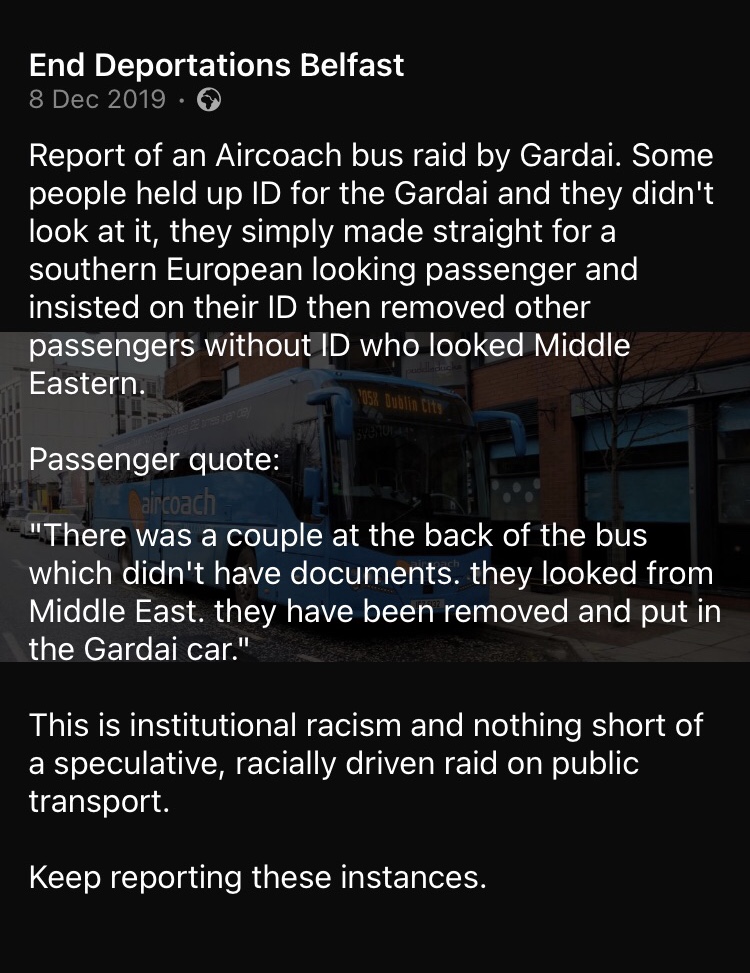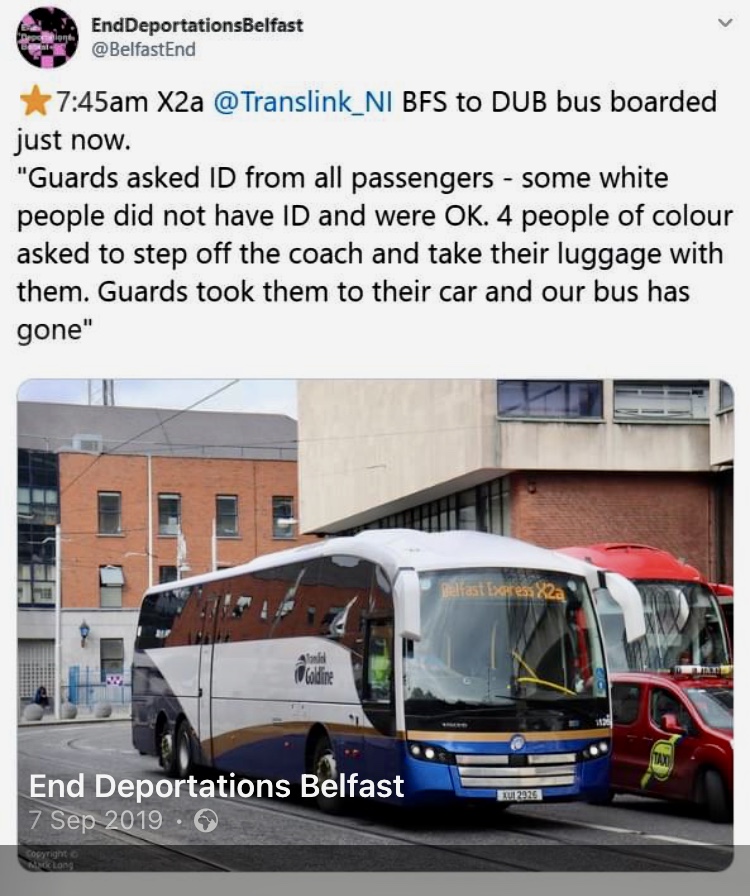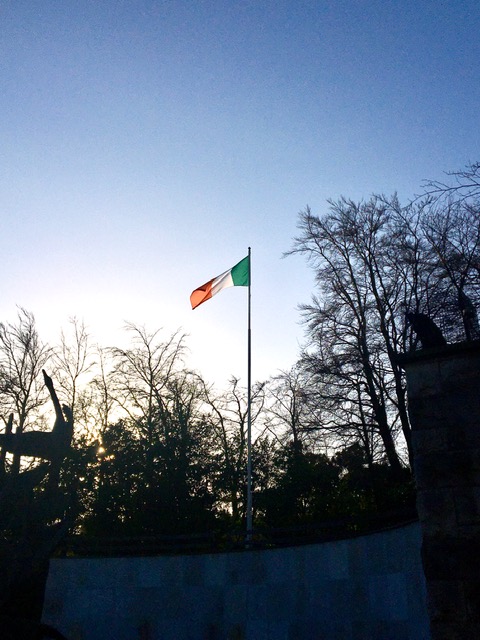Cross-border public transport has become a hotspot for immigration control – on a racial basis.

Racial profiling is connected to rugby in my mind. How does that work? Let me set the scene.
My trip from Belfast to Dublin to watch Ireland play Wales in September 2019 had been long awaited. It promised to be a thrilling encounter, a pre-rugby world cup clash between two home nation rivals. My family and I boarded the cross-border Translink express coach and settled down for the journey. Along the way, we pulled into several stops before reaching the border between Northern Ireland and the Republic of Ireland. At each stop, throngs of fellow fans boarded, bringing freshly excited murmurs and a deepening sea of green – until the sudden stop along the border where our coach was halted and boarded by An Garda Síochána, “the Garda”, (the Irish police force).
It may seem strange, but I had anticipated the stop, the coach being made to pull over into the side of the road. You see, there had been growing discourse about cross-border stops by the Irish police in the months preceding the trip. Growing discourse about how, when boarding these buses, the Guards were conducting immigration checks. Growing discourse about how, in undertaking these checks, the police only seemed to stop and question people who were not white.
I watched as the officers moved down the single aisle. I had told my parents in advance to bring a photographic ID, in case we were asked to confirm our nationality. We pulled our passports out in anticipation. A cheery officer approached us, sparing our passports a quick glance. He moved on, asking two men beside my dad for ID. When they answered that they had no documents on them, the officer reassured them that that was fine, and moved along. The officer stopped before a group of four people – family? – ahead of our seats. Soon, the group was standing, gathering their bags, and being escorted from the coach. Standing by a police car at the side of the road, holding their bags and their passports and looking confused – and more than a little afraid – the group were left behind as our coach was waved on by the officers.
The group members were people of color, and they had been the only non-white passengers on our coach. I witnessed an incident of racial profiling by the police. Three years on, it is still happening on the island of Ireland.
When a border is a barrier to human rights: what’s the issue with racial profiling and the Irish border?
What I saw that day in 2019 was a clear practice of unequal treatment of passengers on the basis of their ethnicity. Although all passengers were approached and asked to present ID, officers barely looked at the ID presented by white passengers. Indeed, the men beside my family were told not to worry about not having ID to hand. The officers were friendly to us, and some exchanged a joke with other passengers or conversations about the rugby. Conversely, the four passengers of color, the only non-white passengers on the coach, received more direct questioning, with a marked change of tone and demeanor. They had their passports and handed them over – but were still asked to remove their luggage and leave the vehicle, with officers following them.
It’s important to understand the connection between racial profiling and human rights. Racial profiling is considered a form of discrimination by the European Network Against Racism, which views the use of racial profiling within policing as racist. International human rights law provides for the right to non-discrimination and seeks to prohibit racial discrimination: there is a UN Treaty, the International Convention on the Elimination of All Forms of Racial Discrimination, which imposes obligations on those countries which sign it to eliminate racial discrimination in all forms. The Republic of Ireland is a state signatory to this Treaty, which means it has duties under international law to tackle discrimination. So, the – ongoing – use of racial profiling by the Garda, a state agency, raises questions as to the compliance of the Irish state towards its human rights duties.
The clash between law and practice
My firsthand experience of racial profiling was a shock because identification checks along the border actually shouldn’t be happening.
There is a tradition of open movement between the UK (of which Northern Ireland is a composite region) and the Republic of Ireland. This dates from 1922 when it was agreed that neither country required passports for travel to the other. This was later underpinned in law in the UK through the Ireland Act 1949. This subsequently became known as the “Common Travel Area”, or the CTA. The CTA means that Irish and British citizens residing in the Republic of Ireland, or the UK, including Northern Ireland, can travel freely between these countries without having to seek permission from the authorities. Basically, the legal operation of the CTA means that British and Irish citizens can be treated “almost identically” within both countries.
In 2009, passport checks for air and sea travel were introduced, but notably, this didn’t extend to the land border. In 2019, as part of wider post-Brexit negotiations, the UK and Irish Governments reaffirmed the CTA arrangements and recommitted to the operation of the CTA. So, stops by the police, and requests for the presentation of ID shouldn’t be happening.
Moreover, this is not a new issue, despite its fairly recent emergence within public knowledge. While media reports of identification checks being carried out on cross-border transport routes within the CTA including the Irish border have increased, these checks appeared to have been taking place since at least 2003. This means these checks have been in operation before the introduction of passport checks for air and sea travel within the area. The stop-and-check practice is not just being carried out by the Garda in the Republic of Ireland. The PSNI (Northern Ireland’s police force) have conducted identification checks on their side of the border, too.
But how does this relate to racial profiling? Is it an issue if immigration checks are being carried out? The problem is that neither the Garda nor the PSNI seems to provide any explanation for why they undertake these checks. Further, even if they did stem from immigration control, the legal basis is questionable: UK and Irish immigration law explicitly excludes CTA travel from passport control regulation. Legal experts have previously made clear that checks along the border posed a risk of introducing and normalizing racial profiling.
This seems to have become reality. As NGOs, trade unions, and grassroots groups have said they believe these checks resemble routine immigration controls, they also have expressed concern that the consequence of this has been the increasing use of racial profiling. This is because of the way both UK and Irish immigration laws perceive non-EU citizens, requiring them to have to carry and produce passports within the CTA. Now, it just isn’t possible to know someone’s citizenship by looking at them, so in theory, checks should be required of all passengers onboard transport which is stopped by the police. But as noted by the CAJ, an independent human rights organization in Northern Ireland, it is actually “impossible” for police officers to conduct these checks in a non-discriminatory, lawful manner. Consequently, it is people of color who bear the brunt of these checks, due to a perception of what a non-EU citizen “looks” like. Such prejudice is not uncommon: academic research has found that immigration officers and police may hold prejudiced views when deploying immigration controls including requests for identification.
Is racial profiling symptomatic of policing in Ireland?
It’s crucial to understand these instances of racial profiling by police across the island are not happening in isolation. They are part of a much wider issue of allegations of institutional racism, both in the Republic of Ireland and Northern Ireland.
The Irish Equality and Human Rights Commission previously described the Garda as having “negative attitudes” towards ethnic minorities which has influenced the practice of racial profiling. It has urged the Irish Government to act, including by introducing an independent complaints mechanism as well as prioritizing the introduction of legislation to prohibit racial profiling. The Garda has denied the use of racial profiling. The police force has pointed to the absence of data on racial profiling, which it says means claims of discrimination cannot be substantiated. However, the Garda itself concedes this is because they have no legal basis to record information on the ethnicity of people arrested or search.
The absence of information does not mean racial profiling is not happening – and civil society has been able to document data where state bodies have not. In fact, we know that ethnic minority groups have been subjected to racial profiling in the Republic of Ireland: research has found that Irish Travellers and Roma are extensively stopped by the Irish police: 70% of Travellers and over 53% of Roma have experienced police discrimination. And we know that people of color have been impacted. Research conducted by the EU’s Fundamental Rights Agency, which asked respondents from a Sub-Saharan African background if they felt they were stopped by the police because of their background, found that 28% of those surveyed in Ireland believed this was the case.
What about Northern Ireland? Well, the PSNI recently found itself mired in allegations of racism through episodes of targeted policing. Following the killing of George Floyd by a police officer in Minneapolis, Minnesota USA, Black Lives Matter protests were held in the cities of Belfast and Londonderry on 6 June 2020. The PSNI cautioned and fined multiple activists in attendance at both protests. The police argued the activists had breached the COVID-19 pandemic regulations, and that would seek prosecutions of the organizers – but it had not used similar tactics towards attendees of an anti-decolonization rally about monuments in the same month. This distinction was remarked on by the Police Ombudsman within its critical report following a review of the PSNI’s actions. This report found the PSNI’s actions had been unfair and discriminatory. A report issued by the Policing Board questioned whether the actions of the PSNI had been lawful, calling for a review of the fines and prosecutions issued. In June 2021, the Public Prosecution Service announced it would not seek prosecutions for the organizers. And after arguing for six months that it did not have the power to cancel issued fines, the PSNI finally confirmed it would refund fines paid by activists, as well as delete the records of issued fines.
It doesn’t stop there. Investigative journalism found that people of color received a disproportionate number of COVID-19 fines in Northern Ireland between 2020-2021. Over 4.2% of all fines were issued people from black and minority ethnic (BAME) backgrounds, with fines issued to black people comprising half of these – despite black people being only 0.2% of the population in Northern Ireland. This falls within a wider trend of racial profiling within policing in Northern Ireland, as statistics released this year showed that people from BAME backgrounds accounted for 5% of 25,503 stops by the PSNI; again a disproportionate number.
The criminalization of people of color is therefore a documented, clear, and pressing issue, and racial profiling is one of the ways in which it operates.
The role of grassroots activism in documenting racial profiling
As we have seen, civic society has long led the charge in documenting the issues of discrimination within policing and immigration control on the island of Ireland. It also has led the way in combatting it.
Grassroots campaign group End Deportations Belfast was established to challenge border controls and deportations within the UK immigration system. It became aware of the issues of racial profiling and identification checks on the border in 2019. After it began to notice an increase in reports from eyewitnesses as to the practice, which it documented on its social media channels, the organization announced it had established a reporting mechanism. This could be used by members of the public to record incidents of racial profiling – important particularly in the context of the lack of records held by the Garda. The reporting mechanism is deliberately designed to be as accessible as possible in the spirit of addressing barriers to accountability. Moreover, End Deportations Belfast aims to address the excuses offered by state agencies regarding the lack of official data recording. The organization urges the public to report any incidents they observe to the authorities directly, such as public transport operators Translink as well as via its own reporting mechanism, as a means of demanding accountability.

End Deportations Belfast has worked to raise awareness of racial profiling on cross-border journeys. Reports submitted to its volunteers may sometimes be shared publicly through the movement’s social media channels to highlight the matter and to generate discussion. This was how I had heard about the issue of racial profiling on cross-border public transport myself, and that there was a way to help collate data on the issue. When I witnessed racial profiling in 2019, I filled out a report through the mechanism. I also contacted the organization directly, and my report was subsequently quoted on its social media channels to raise awareness.

The reports are also collated by the movement, with data being shared with the CAJ and the ICCL, a human rights organization in the Republic of Ireland, in order to demonstrate the scale of the issue. The gathering of documentation is essential so that these well-known civil liberties organizations can engage in evidence-based advocacy and refute dismissals of the scale of the matter, including from the state agencies involved.
What has been the impact so far?
The data collected by End Deportations Belfast has been used by the CAJ and ICCL to seek accountability. In 2019, they jointly wrote to the Garda Commissioner, the Irish Justice Minister, and the Irish Policing Authority to outline their concerns. The results of this letter were mixed.
The Ministry of Justice only addressed the concerns when the matter was raised in the Dáil (the Irish Parliament), with the then Minister downplaying the issue through a brisk statement. The then Minister asserted the checks were not passport checks and were only used by the police from “time to time”. In response to questioning at an Oireachtas Committee, the Garda Commissioner merely defended the practice on the grounds of maintaining national security.
The CAJ and ICCL have not accepted these responses and instead sought to utilize other avenues to advance their concerns. Since 2021, the organizations have engaged with the Irish Equality and Human Rights Commission. They asked the Commission to exercise its legal investigative powers – and the Commission did. This year, the Commission wrote directly to the Policing Authority to outline its investigative work, and to request the position of the Policing Authority on the allegations of racial profiling raised by the CAJ and ICCL. It continues to review the matter, whilst the Policing Authority is engaging with the Garda Commissioner.
In Northern Ireland, the CAJ used the data logged by End Deportations Belfast to submit a complaint against Translink for facilitating cross-border ID checks. Translink tried to argue it was legally obligated to allow its buses to be boarded by police; when pressed by the CAJ to explain these obligations, Translink was not able to answer.
Where next?
There still is no law against the use of racial profiling by law enforcement in the Republic of Ireland, nor has any independent complaints mechanism been introduced. The Irish Equality and Human Rights Commission continues to advise the Irish Government to introduce a legal definition of racial profiling and its prohibition. The Commission has also reiterated its concerns about racial profiling and the lack of legal readdress against it within the state to the UN Human Rights Committee.
Efforts to secure intervention from the Irish Government on racial profiling may not go far, however, as the Irish Government continues to reject the concept of racial profiling at the border. Just this month, An Taoiseach (the Irish Prime Minister) stated there is “no hard border in terms of people being racially profiled at the Border” within the Dáil, a claim met with disbelief by End Deportations Belfast.
“We have testimonies, photographs and video that show otherwise. Even a member of the Seanad has witnessed it first-hand.”
End Deportations Belfast statement of 6 October 2022 as posted on its Facebook page on the same date.
End Deportations Belfast continues to urge fellow passengers and members of the public to report incidents of racial profiling through its reporting mechanism. It has begun to directly reference specific streets in Belfast in which it believes people of color are stopped by police, requesting eyewitness information. It has also updated its monitoring mechanism by including a direct link to the INAR, an Irish anti-racism organization. The INAR works to highlight the ongoing presence of racism, including institutional racism, in Ireland. It actively lobbies for legal reform, such as enhanced hate crime legislation, and collates data on racist incidents to ensure it uses evidence-based approaches within its work.
It is evident that there is a clear contradiction between the legal frameworks and the police practice along the Irish border, the outcome of which is discrimination that impacts the rights and dignity of people of color. Until the Governments and police forces on either side of the border accept the operation of racial profiling, it falls on us to promote awareness of the facts and of the law. Through education and awareness-raising, we can see change. People can be empowered to ask questions of the police, as well as understand their rights – challenging injustice as active citizens.
If you are interested in learning more about End Deportations Belfast, its work, and activism, you can follow the movement through its social media platforms: Twitter; Facebook; and WordPress site.
If you have noticed racial profiling conducted on a cross-border journey on the island of Ireland, you can use End Deportations Belfast’s reporting mechanism.
For examples of the increase in media coverage of cross-border checks, see the Belfast Telegraph (9 May 2019), and the Journal.ie (19 September 2019) and (25 September 2019).
IVolunteer International is a 501(c)3 tech-nonprofit registered in the United States with operations worldwide. Using a location-based mobile application, we mobilize volunteers to take action in their local communities. Our vision is creating 7-billion volunteers. We are an internationally recognized nonprofit organization and is also a Civil Society Associated with the United Nations Department of Global Communications. Visit our profiles on Guidestar, Greatnonprofits, and FastForward.


